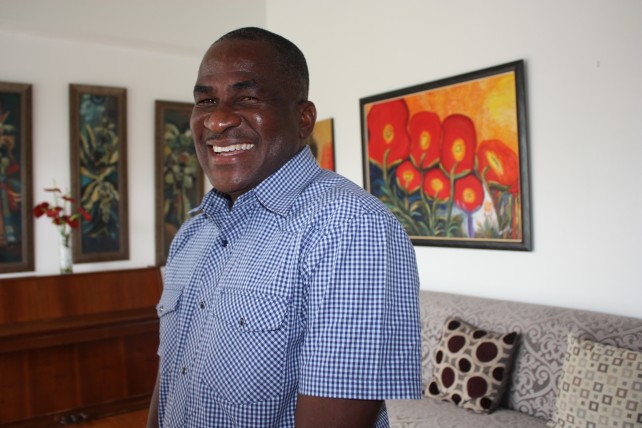
The AIDS targets of Millennium Development Goal 6— halting and reversing the spread of HIV—have been achieved and exceeded, according to a report released by the Joint United Nations Programme on HIV/AIDS (UNAIDS).
New HIV infections have fallen by 35% and AIDS-related deaths by 41%. The global response to HIV has averted 30 million new HIV infections and nearly 8 million (7.8 million) AIDS-related deaths since 2000, when the MDGs were set.
“The world has delivered on halting and reversing the AIDS epidemic,” said Ban Ki-moon, Secretary-General of the United Nations. “Now we must commit to ending the AIDS epidemic as part of the Sustainable Development Goals.”
The response to HIV has been one of the smartest investments in global health and development, generating measurable results for people and economies. It also shows that the world is on track to meet the investment target of US$ 22 billion for the AIDS response by 2015 and that concerted action over the next five years can end the AIDS epidemic by 2030.
“Fifteen years ago there was a conspiracy of silence. AIDS was a disease of the “others” and treatment was for the rich and not for the poor,” said Michel Sidibé, Executive Director of UNAIDS. “We proved them wrong, and today we have 15 million people on treatment—15 million success stories.”
Caribbean Successes
The Caribbean has experienced several wins in relation to offering its people life-saving antiretroviral treatment. When the Millennium Development Goals were launched in 2000, HIV treatment was not widely available in the region. As of 2014, 44% of all people living with HIV in the Caribbean are on treatment. Over the last decade AIDS-related deaths have fallen by 59%. In 2014 13,000 people were newly-infected with HIV in the region, down from 27,000 in 2000. The Caribbean’s testing and treatment rates to prevent mother-to-child HIV transmission are among the highest in the world. In June Cuba became the first country to be validated by the World Health Organisation as having eliminated HIV transmission from mothers to children. Several other Caribbean countries are on track to repeat this feat in the next year.
“Having access to treatment in 2003 is the biggest, best thing that has happened to me,” said Ainsley Reid, Chair of the Caribbean Regional Network of People Living With HIV. “I know that without meds I would probably have passed years ago because I saw my body declining. I was afraid to leave my house because people would ask questions about how I looked and people were making statements. Having access to treatment has caused me now, with a lowered viral load, to go back to work. I can now take care of my family. I have a house. I bought land. I have a family to take care of.”
Reid has been living with HIV for 23 years and has an undetectable viral load.
Challenges remain
Despite the strides, challenges remain. HIV treatment coverage is notably lower for children than for adults, with only 36% of children living with HIV in the Caribbean in 2014 obtaining antiretroviral therapy. And despite the fact that treatment is now available in every country, stigma and discrimination still make it difficult for people to get tested, to initiate treatment and to stay in care.
As the world moves toward a strategy to end AIDS by 2030 it is imperative that no one is left behind. In the context of the Caribbean this entails adapting prevention efforts to respond to the needs of vulnerable geographic and demographic communities including youth, men who have sex with men, sex workers and drug users.

The contribution of the Caribbean island nations towards treating people infected with HIV speaks a message of hope to the world.
A Caribbean nation – Cuba – stands out as the first nation to achieve a zero mother to child transmission rate of HIV, and other island nations are following suite. Collectively the islands are becoming a leader in the field due to the dedication and hard work of many professionals and their support teams.
I could not help notice the speed with which the Caribbean responded to the availability of the drugs. Treatment plans were put in place and it appears no time was lost.
The success of the treatment is encouraging with a significant drop in both new infection and deaths.
Mr. Reid’s ability to contain the disease for 23 years and now be back to work with an ”undetectable viral load” tells the world it can be done!
Let people know the help that is available.
Thank you Mr. Reid
Thank you DNO
Sincerely, Rev. Donald…
how can aids stop when u legalizing homosexuality?
Thank God Dominica is not at this time legalizing homosexuality and many of us hope it never will.
Male homosexuals are the one single group in some nations with the highest rate of AIDS and seem to be the most responsible for the spread of the disease. It is also spread by sex trade workers and those who use their services. Homosexuality and prostitution should both be illegal for moral AND health reasons. The laws that forbid these activities should be enforced.
There is nothing as effective in the battle against AIDS as God’s moral code in the New Testament when it is applied. It works 100% of the time. It is found in Romans 1:26,27, and 1 Corinthians 6:9,10 with 1 Corinthians 6, 18-20, and Jude vs. 7. This is abstinence before marriage and chastity within a monogamous marriage. This should be taught by parents in the homes, by teachers in the schools, and by
pastors in the churches. Governments should be encouraging this
Sincerely, Rev. Donald Hill. Evangelist.